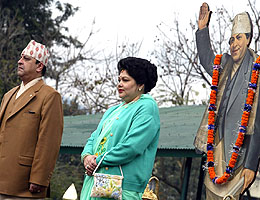Democracy and Trust
We fight so hard for democracy because we have all learned to believe in the system. It is based on trust. Those of us in democratic countries value trust. It is why we install so many protections in government to maintain that trust. It is why we reflexively speak against those who appear to stifle or slow down democracy for any reason.
The world has now existed for many generations with various examples of democracy. It is no longer a novel concept. It can be argued, now that the newness has worn off, that we are so comfortable with the freedoms under democracy that we have forgotten what it costs to maintain such a system. It is trust.
Trust is our reason for why democracies succeed where communist regimes often fail. Democratic societies rely on public trust, to be sure, but there are checks, and balances put in place to insure that trust. Multi-cameral legislative bodies, a strong constitution backed by an impartial judiciary, legislative transparency and rule of law to name a few. A system based on trust implies that the trust can be taken away or given to someone else - like a contract. Non-democratic systems like Communism rely on faith: an almost religious belief in the power of an ideology or individual-faith with no questions asked. Unfortunately, non-democratic systems have no use for public trust. They will tolerate neither dissent nor public oversight. Ideal democratic systems allows for dissent. Dissent and debate reinforces and strengthens public trust in a system.
Today, people have learned to manipulate the often slow-moving wheels of a democracy. Humans always seem to have some element of greed and personal gain in their psyche. When we see a crack, a flaw in a system, we will exploit it. We will also swim upstream, against a democracy’s reliance on public trust, to further our own prosperity if we must. Criminals and politicians who actively seek loopholes in the system are one example. Religious, cultural and political zealots who proclaim the supremacy of their needs and values above all others are but another. The new reality is that the trust that is incumbent to a normally functioning democracy is eroding. It is a measure of decline when we see less people sacrificing for the public good and more people seeking to “cash-in” on the democratic freedoms so hard won by out predecessors. Democracy today, and as was practiced in Nepal, seems more of a catchall concept that effectively says: “anything goes.”
India, the world’s largest democracy seems to fit this mold. Unfair, baksheesh-based practices, cronyism, nepotism and, not to mention, a very undemocratic caste system indicate that the world’s largest democracy uses the label as an umbrella to conceal a myriad of concepts and practices that fall well outside those the western world feel to be democratic.
If it existed at all, the public trust in Nepal was broken under the weight of government corruption and hubris. But were the foundations of trust ever laid? On the surface, an initial parliament and a somewhat representative government with a Supreme Court and rule of law seemed a good beginning. But democracy is a western concept. To ask an entrenched Asian culture to take it on faith that everything will be fine if they’d just adopt democracy is simplistic and foolhardy. The idea of relying on a centralized government body to meet your needs was a foreign concept in Nepal. There is that deep history of unilateralist and occasionally abusive rulers to factor into the equation as well. In the face of this, most Nepalis, initially, were just mildly indignant towards government abuses and corruption: it just wasn’t much different from what they were used to so they never considered raising their voices to demand accountability. When scandals like the Lauda Air deal surfaced however, Nepalis became more politically angry. They realized, rightly, that they were not receiving adequate representation and that their trust in their new democracy was being betrayed.
The Nepali government never bothered to maintain public trust. In fact, they never left Kathmandu. No government policies were effectively realized in rural areas. Back in 1996, however, the Maoists were gaining trust village by village. They initially collected donations and were responsible for providing some local services. Nepalis, feeling politically alienated, began to listen more attentively to these new Maoist voices. Eventually, as they grew in power and brutality, the Maoists became the threat that they are today.
The King, for all his unpopularity, recognizes this most fundamental threat to any present or future democracy in Nepal. His takeover represents an attempt to correct a system that failed to address this threat. He is making a choice that the prior government was unable and unwilling to make: he is going after the Maoists. Success will wipe the slate clean for Nepal to embark on a political system that, hopefully, is worthy of the trust of its citizens; failure leads to no choices and no chance for reforms.
Democracy must once again gain a foothold in Nepal. This time, it must be a participatory democracy. It is only when each Nepali feels that their voice is being heard in government, that their trust in government and democracy will return. Those in the world community who demand the immediate return of democracy to Nepal are merely posturing. If you do not have the full participation of all citizens, then reintroducing democracy simply reintroduces chaos. Nepal’s Maoists, in their current form, will not participate in any new democracy. They are the angry byproduct of lost public trust and will continue to reflect that anger until they are removed.
Democracy is not the cure-all answer for everything. Democracy is just another vehicle for the pooling of public trust. With the absolute trust of citizens and officials, any system would work, including communism. Betray public trust once it is offered and no mere label can save your society.
-=blogdai









